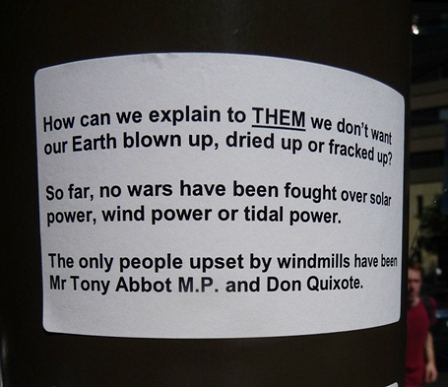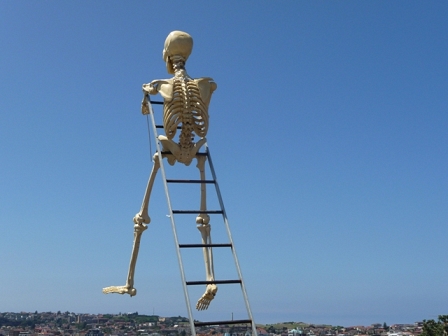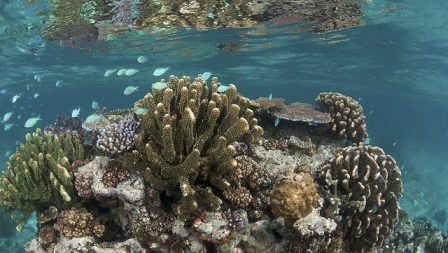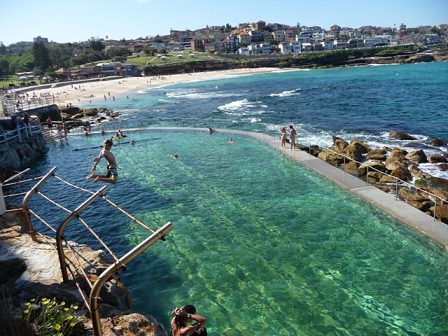Erstellt am: 8. 11. 2013 - 12:53 Uhr
Rich But Burning
At a meeting of the Global Warming Policy Foundation in London this week, a think-tank set up by climate-sceptic and Nigel Lawson in the run up to the Copenhagen climate summit, former Australian Prime Minister John Howard triumphantly announced that public support for "overzealous action" was on the wane.
He called those advocates of action of the prevention of climate change and mitigation of its effects “alarmists” and said that their “cause has become a substitute religion”.
He argued that the current Australian Prime Minister Tony Abbott had been courageous to campaign to victory on an openly climate sceptical platform.

chris cummins
The day after Howard`s speech Australia announced it will have no government minister at the main United Nations climate negotiations which begin next week in Warsaw.

chris cummins
You might think that such scepticism is anachronistic. The latest IPCC climate report was described by the UN Secretary-General Ban Ki Moon as “unequivocal”. The panel of international scientists concluded that it was 99% certain that human activity was responsible for climate change and that unless measures were taken global temperatures were likely to rise by up to to 4.8C, by the end of the century.
"The heat is on. No we must act”, said Ban.
He was backed up by US Secretary of State John Kerry who said "those who deny the science or choose excuses over action are playing with fire."
But John Howard is still not convinced. He told the audience in London that doctors had once told him that ulcers were caused by stress but later it was established that a virus was to blame for the health problem which led him to conclude that "you can never be absolutely certain that all the science is in."
Yet, because of its extreme climate, environmentalists have often described Australia as the “frontline of climate change” and there are worries that climate change is already costing the country dear. This year the fire-season has been particularly destructive and came earlier than usual, with fires in September, during Australia`s winter.

chris cummins
“We suffering fires for a longer period of the year and they are covering a bigger and bigger area,” says Tim Bonyhady, a Canberra-based environmental lawyer. “It might be that one can’t say that a particular fire is because of climate change but the greater increase and greater spread is clearly connected to climate change,” says Bonyhady, “and the government just chooses to ignore that.”
If the Australian Department of the Environment accepts the link between increased fires and global warming, but it seems the political leadership has its head in the sands.
So why did Australia become the apparent global leader in climate scepticism? “Australia is open for business” declared Prime Minister Abbott has he celebrated his election victory in September by vowing to repeal the carbon emissions tax and a levy on the profits of resources companies with the words. According to Tim Bonyhady this anti-environmentalist mood goes far beyond issues of the climate change and is due to an assumed conflict between economic opportunity and environmental regulation:
“The last couple of years things have got much worse” says Bonyhady, “We have gone through a period of fairly weak decision making but now we`ve got conservative governments at a state level virtually everywhere and a federal conservative government and the state governments have set about weakening and removing environmental controls virtually everywhere.”

chris cummins
Bonyhady lists decision to allow grazing and tourist development within the boundaries of national parks. “Queensland for example used to have quite strong laws stopping land clearing of significant vegetation but they have been weakened and now we have a federal government with the same ideology.”
But why?
Bonyhady says that the situation is connected with the experiences of the global financial crisis. “Australia survived that crisis much better than other countries. We have the highest living standards by most measures at the moment and yet we seem to have an increasing culture of greed. Part of that greed is environmental exploitation and destruction regardless of the cost.”
The Great Barrier Reef is one of the most dramatic victims of this philosophy that puts industrial interests ahead of conservation. The iconic reef is already under threat due to climate change which has led to warmer and more acidic oceans. But Bonyhady says it is also suffering, says because of Australia`s “rampant mining of coal.”
The WWF is involved inefforts to protect the Great Barrier Reef but the conservationist say: "It is imperative that action be taken at a national level to reduce CO² emissions."
The country has huge deposits of coal and the state governments are partly dependent on royalties from coal export so are reportedly making it easier for the mining companies to export the coal to energy hungry countries like China. This comes at the expense of one of the planet`s most spectacular stretches of biodiversity: “We are engaged in huge port development. This means more and more dredging and the dumping of what is dredged into the reef. The reef is in a state of crisis.”

WWF Jürgen Freund
One of Abbotts first moves as Prime Minister was to axe the Climate Commission its work has been carried on the by the non-governmental Climate Council, whose CEO Amanda McKenzie says "The earth continues to warm strongly posing serious economic, health and environmental risks for Australia."
But if Howard was correct and Tony Abbott's recent truly victory was founded on climate scepticism, why does message resonate with Australian voters?

chris cummins
Well perhaps fear over job losses in the traditional mining industry partly explains it and Bonyhady blames it partly on the influence of newspaper and television magnate Rupert Murdoch: “The Murdoch media is very powerful has been pretty consistently in climate denial.” But he says it is also due to broad shifts in Australian society:
“We are going through a more materialistic kind of patch. I have no idea how long it will last. It may last a few years and affects all generations. Young people might care more about the environment but there has still been some shift because of this interest in materialism.”
Dieses Element ist nicht mehr verfügbar
For a country blessed with such a magnificent nature this seems a terrible shame.


